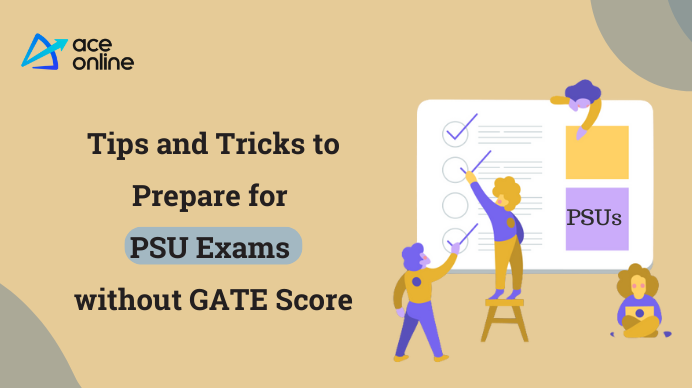
Tips & Tricks to Prepare for PSU Exams Without GATE Score
Are you aspiring to secure a prestigious job in a Public Sector Undertaking (PSU) but don't have a GATE score? Don't worry! With the right tips and tricks, you can still excel in PSU exams and open the doors to a rewarding career. While GATE scores are often preferred, many PSUs conduct their own recruitment processes, providing opportunities for candidates without a GATE score. In this article, we will guide you through effective strategies and techniques to prepare for PSU exams without relying on a GATE score. From understanding the exam pattern to mastering core subjects, we'll equip you with the knowledge and confidence to excel in these competitive exams. So, let's dive into the world of PSU exam preparation and unlock your pathway to success!
Public Sector Undertaking (PSU) exams are highly sought after by engineering graduates seeking stable and rewarding careers in the public sector. While many PSU recruitment processes consider GATE scores a significant criterion, securing a position without a GATE score is still possible. In this article, we will explore effective strategies to prepare for PSU exams and increase your chances of success.
When it comes to Public Sector Undertaking (PSU) exams, different PSUs have their unique exam patterns and selection processes. Here are a few examples of PSUs along with their respective exam patterns:
National Thermal Power Corporation (NTPC)
NTPC conducts the recruitment process through an online examination comprising two stages:
Stage 1: Online test consisting of subjects like General English, Quantitative Aptitude, Reasoning, and General Awareness.
Stage 2: Online test focusing on Technical Subjects related to the candidate's discipline.
Oil and Natural Gas Corporation Limited (ONGC)
ONGC conducts recruitment exams through the following stages:
→ Stage 1: Computer Based Test (CBT) consisting of subjects such as General Awareness, Aptitude, and Technical Questions.
→ Stage 2: Personal Interview or Group Discussion (depending on the position).
Bharat Heavy Electricals Limited (BHEL)
BHEL conducts a written examination consisting of two parts:
→ Part 1: General Aptitude and Reasoning.
→ Part 2: Technical Knowledge questions specific to the candidate's discipline.
Steel Authority of India Limited (SAIL)
SAIL conducts a written examination followed by a Personal Interview:
Written Examination: Consists of sections like General Aptitude, Reasoning, Numerical Ability, General Awareness, and Technical Knowledge related to the candidate's discipline.
Power Grid Corporation of India Limited (PGCIL)
PGCIL conducts a selection process comprising the following stages:
Written Examination: Focuses on Technical Knowledge, Aptitude, Reasoning, and General Awareness.
Group Discussion (GD) or Personal Interview (PI).
It's important to note that the exam pattern and selection process may vary from PSU to PSU. Candidates are advised to carefully go through the official notifications and websites of the respective PSUs for accurate and updated information.
Preparation strategies should be tailored according to the specific exam pattern of the PSU you are targeting. Utilize previous years' question papers, mock tests, and study material relevant to the subjects specified by the PSU to enhance your chances of success.
How to prepare for PSU Exams?
Research and Understand PSU Exams:
First and foremost, research the various PSU exams available and the eligibility criteria for each. Familiarize yourself with the specific exam pattern, syllabus, and selection process. This will help you develop a focused study plan tailored to the requirements of each PSU.
Identify Relevant Study Material:
Identify the recommended textbooks, reference materials, and online resources for the respective PSU exams. Make sure to gather study material that covers the essential topics and concepts. Previous years' question papers can also serve as valuable resources to understand the exam pattern and identify recurring topics.
Create a Study Plan:
Develop a well-structured study plan that allocates sufficient time for each subject. Set realistic goals and create a timetable that suits your schedule. Divide the syllabus into manageable portions and assign specific time slots for revision. Remember to include regular breaks to avoid burnout.
Focus on Core Subjects:
Emphasize the core subjects that are commonly tested in PSU exams, such as engineering mathematics, technical subjects related to your discipline, and general aptitude. Dedicate more time to these areas to build a strong foundation and understanding of the concepts.
Practice Mock Tests and Previous Year Papers:
Take advantage of mock tests and previous year's papers to simulate the exam environment and assess your preparation level. Analyze your performance, identify weak areas, and work on improving them. This practice will also help you manage time effectively during the actual exam.
Stay Updated with Current Affairs:
Stay updated with current affairs, especially in the fields related to the PSU you are targeting. Develop a habit of reading newspapers, magazines, and online news portals to stay informed about the latest developments in technology, economy, and industry.
Join Study Groups or Coaching Classes:
Consider joining study groups or enrolling in coaching classes specifically designed for PSU exams. Interacting with like-minded individuals can provide a supportive environment for learning and sharing knowledge. Additionally, expert guidance and structured study material offered by coaching institutes can enhance your preparation.
Build Exam-Specific Strategy:
Each PSU exam may have its unique pattern and requirements. Understand the specific exam format, marking scheme, and time constraints. Develop a strategy to tackle different sections, prioritize questions, and manage time effectively during the exam.
Stay Motivated and Maintain Discipline:
Preparing for PSU exams can be challenging and requires consistent effort. Stay motivated by setting short-term goals, rewarding yourself for milestones achieved, and maintaining a positive mindset. Discipline is key to successful preparation, so ensure you follow your study plan diligently.
Despite the fact that GATE scores are often preferred in PSU recruitment processes, a lack of GATE scores does not hinder your chances of securing a position in the public sector. With dedicated preparation, a focused study plan, and a thorough understanding of the exam requirements, you can overcome this obstacle and achieve success in PSU exams. Remember, perseverance and determination are crucial, so stay focused on your goals and give your best effort. Good luck!
ACE Online Newsletter
Join the newsletter to receive the latest updates in your inbox.






